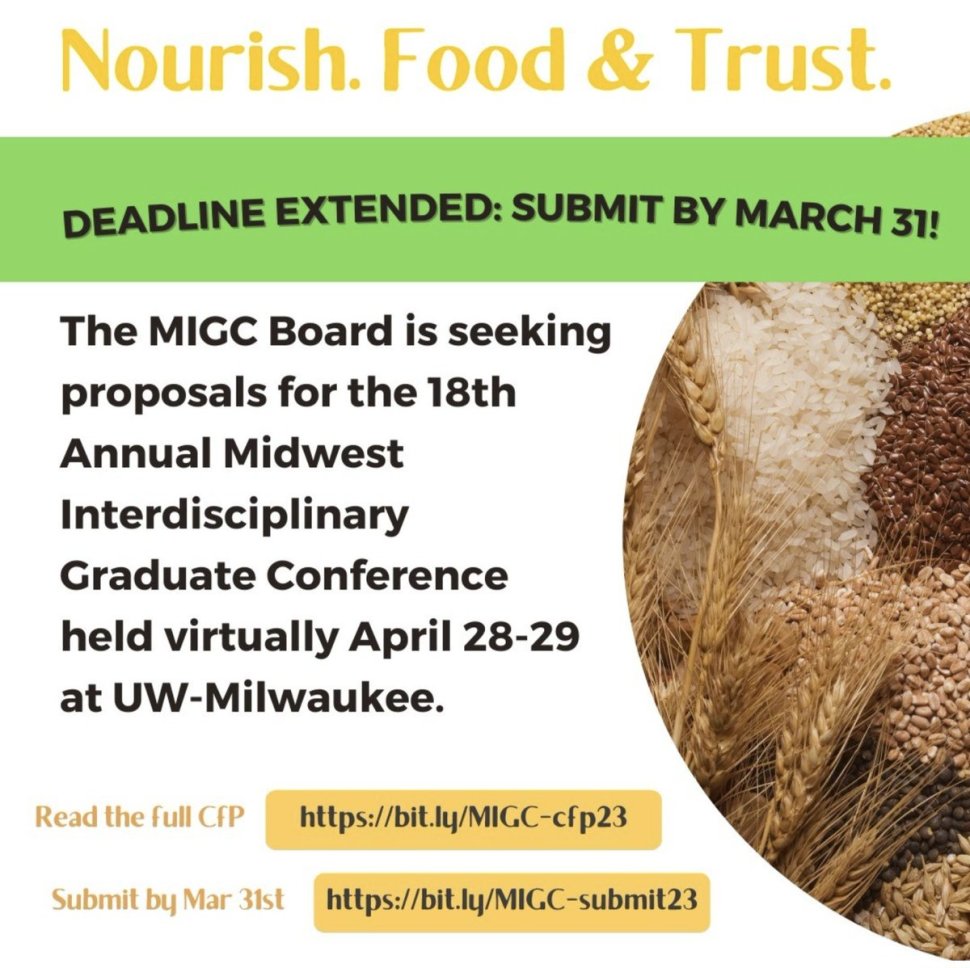Call for Proposals
Nourish: Food & Trust.
The 18th Annual Midwest International Graduate Conference at UWM
Held Virtually April 28-29, 2023
The MIGC Board is seeking proposals for the 2023 Virtual Conference around our theme of Nourish: Food & Trust. Deadline extended for proposal submission: March 31st, 2023.
In partnership with the Center for 21st Century Studies, MIGC invites emerging scholars across all disciplines and research interests to present work that connects with the C21 annual theme of Nourishing Trust. The middle piece of a three-year programming arc on democracy, Nourishing Trust centers on issues of food and land justice.
We invite graduate students to explore this theme with the following guiding questions:
- How do scholars across disciplines approach the connection between food and trust within the broad theme of nourish?
- How do scholars approach human rights, such as access to food, in a way that fosters trust among non-academics?
- How can scholars center queer and BIPOC cultural ways of knowing when approaching topics related to food and land justice?
To foster interdisciplinary collaboration, traditional proposals, creative submissions, and works in progress are welcomed. MIGC recognizes the financial strain many graduate students face – there is no fee to apply or present at this virtual conference.
Submit your proposal at https://bit.ly/MIGC-submit23 by March 31st, 2023.

Land Acknowledgment
We affirm Indigenous sovereignty and acknowledge in Milwaukee that we are on traditional Potawatomi, Ho-Chunk and Menominee homeland along the southwest shores of Michigami, North America’s largest system of freshwater lakes, where the Milwaukee, Menominee and Kinnickinnic rivers meet and the people of Wisconsin’s sovereign Anishinaabe, Ho-Chunk, Menominee, Oneida and Mohican nations remain present. Listen to this acknowledgement.
Potential Topics
We are particularly interested in submissions related to the following topics:
- Agriculture
- Art and building trust
- BIPOC food & land justice
- Community food initiatives
- Cooking and culinary practices
- Cultural access to food & farming
- Ecology and traditional ecological knowledge (TEK)
- Environmental history and environmental studies
- Food deserts
- Food as medicine
- Food and health
- Food journeys
- Food production
- Food policy
- Food and land sovereignty
- Foraging
- Gender Justice & Food production
- Histories of food and related land dispossession, resistance, and resilience
- Philosophies of trust
- Restorative justice
- Representations of food
- Reproductive justice
- Science and technology studies
- Queering Farm Work
- Queering Food Justice
- Water
Variations on the theme of Nourish: Food & Trust are also welcome. We invite you to make the connection between your work on the conference theme explicit in your proposal. Please also be clear about the connection between your work and the connection to justice-oriented principles.
Session Formats
We encourage participants to submit proposals in a variety of formats.
Submissions for creative proposals should be appropriate to the medium or discipline. Creative submissions may come in the form of film, music, performance, or visual presentation. Participants are invited to think creatively about translating installation pieces to the virtual format.
Other formats include:
- Traditional 15 minute conference paper
- Research poster, full panel, roundtable, or workshop (please provide all participants information in submission)
- Five minute lightning talk of a work in progress (will be in a group of 5-10, informal). Include a brief overview, highlights, and key takeaways from an initiative.
Proposal Evaluation
Traditional submissions should include a title, ~300 word abstract, and 3-5 keywords. Creative submissions may use a written format or upload an image or short video (up to 30 seconds). Submissions will be evaluated on the basis of connection to the theme and overall proposal strength.
Strong submissions will make connections between the conference theme and submission topic. Written proposals should include an introductory statement which clearly describes the topic and/or problem and a clear description of the purpose/argument that identifies the significance or stakes of the project. Creative proposals should include a clear description of the creative work to be performed and/or exhibited and include a description or demonstration of how the piece is thought-provoking, engaging, or intellectually stimulating.
Feature Image: “Danilo & Natalia Fajardo Chaves of Migrant Justice Connecting the Dots Between Food Justice and Climate Justice” by 350VT is licensed under CC BY-NC-SA 2.0.
Nicole Welk-Joerger
Latest posts by Nicole Welk-Joerger (see all)
- Call for Proposals – Nourish: Food & Trust. - March 27, 2023
- The Food Animal Problem/The Food Animal Solution - December 4, 2017